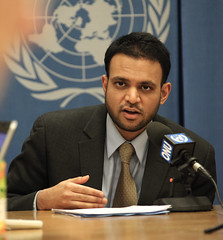Hasan A. Yahya, Ph.Ds
Since man existed on earth, freedom for him is two types in definition, one is freedom of, and the other is freedom from. While in theory they both may mean related to each other, in reality they are far from each other according to cultural norms and mores. Freedom of is the absence of constraints on behavior, it means freedom to do something. In modern time, the two types are defined logically as related to each other in any political system. In this sense, freedom is synonymous with liberty in two important areas, freedom of worship, (religion in general), and freedom of speech. The freedom from, however, includes two types of freedom. Freedom from fear, and freedom from want. In both areas, immunity from fear and want against oppression and exploitation and immunity from discrimination and racism, and both are equated with equality and justice.
The influence of the concept order, however, makes the difference in practice, for example, under authoritarian political systems freedom of is largely forgotten, through legislation or executive branches of governments. This means, that freedom from, fear and want is also persistent. I believe that freedom of is more applicable than freedom from in both authoritarian and liberal political systems, at least, theoretically. They are nonetheless, differ greatly, in application.
Order, whither, social or political, refer to established patterns of authority in society. Where traditional modes of behavior are followed. It is the norms of doing things. Such norms prescribe behavior in different areas, such as school systems and students’ behavior in schools, by appearance and obedience. Marriage behavior according to law (religious or secular), and press publication and explicit photography (without anarchy).
In modern time, states are different in applying freedom of, or freedom from according to their political systems. While in advanced countries we may observe justice, and liberty in both types of freedom, justice and liberty are rarely noticed in totalitarian or traditional systems like the Arab countries for example. In most of the Arab states, liberty is limited and justice is exploited by those who have ( power, or wealth) over those who have not (non-citizens-workers, and service people, the less educated). While we use here two important concepts in Marx’s theory of capitalism, we do not mean, that they mean the same thing after more than a century ago. The means of production and property ownership is taking new shapes under the concept of order, especially, the political one.
In the Arab countries, where lack of laws application from traditional personalities undermines liberty and justice, where both became culturally accepted without resistance. If not, they will be exploited by security measures of order.
Terrorism as we knew in recent years have played a vital role in making deviation from all types of freedom, Religious, free speech, fear and want, where corruption of traditional regimes, helps out the idea of keeping the state order by ignoring freedom of and freedom from. So we see that product prices has no limits, and bread becomes more and more less in health value and more in price.
In strategic planning, or in the transitional periods from one old political system to another more open to all types of freedom, Arab states are urged to apply both types of freedom, at least freedom of worship and liberty, because these two can be applied away from discrimination and exploitation by following the rules of law, which is absent in most Arab countries. Rules of law, however, do not mean, traffic laws, or marriage laws, but laws of justice and equality of citizens and non citizens alike, live inside their borders. Rules of law of limited presidency ( where presidency periods go up to four plus times or life, in Algeria, Egypt, and Tunisia, for example)
I believe, if this happened, and rules of law become understood, in theory and application, we, then, would say, that the Arab countries are in the right track of healthy governments. While symptoms of this vision is showing in some areas, traditional application of rules of law are missed from government departments, especially the ones connected to cultural norms built up through centuries of wrong beliefs and heretics of rulers, theologians and sheep-like conformity, citizens. ( 715 words) www.dryahyatv.com
Hasan A. Yahya is an American Arab scholar, and a professor of cultures and sociology. He published 19 Arabic and 8 English books and 200 plus articles on sociology, psychology, politics, poetry, IQ Test Measurement and short stories in both Arabic and English. His articles may be found on articlesbase.com, Face book and other internet sites. His recent book published on Amazon titled: Therapy Cases: Mental and physical, 2008, and Lawlaki: Poetry Diwan, 2000 Bayt Min al-Shi’r al-Arabi. (all in Arabic on amazon- 2009). His recent activities reflects his talents and knowledge on youtube’s Dryahyatv.com Dr. Yahya resides in Michigan, USA. Dr. Yahya has four children and eight grandchildren.
Article from articlesbase.com


